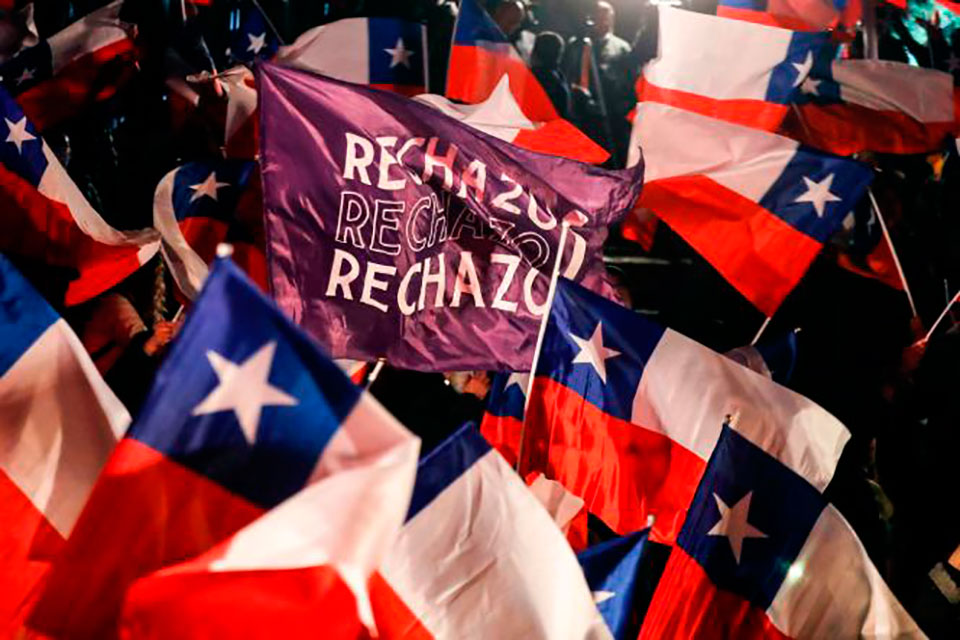This September 4, the election was held in Chile to decide whether or not Chileans approved the new constitutional text, a proposal born from the 2019 anti-government protests against the management of then president Sebastián Piñera. The rejection option took more than 20 points of advantage
With more than 99% of the tables counted, the Rejection was imposed with an overwhelming 61.92%. The option of accepting the new Magna Carta, backed by President Gabriel Boric, was supported by only 38% of voters.
According to official data, the rejection option prevailed in the 16 regions of the country, while the ‘approval’ option won only abroad.
With this resounding rejection, the current Fundamental Law will remain in force, although the Chilean president has already announced that he will convene a new constitutional process and that the mandate of the October 2020 plebiscite will be fulfilled, in which almost 80% of Chileans requested a constitutional change. However, uncertainty is growing because there is still no political agreement on how this new process will be developed.
15 million Chileans who were called to the polls to say yes or no to the draft Constitution. This proposal, born from the 2019 anti-government protests against the management of then president Sebastián Piñera, seeks to replace the Magna Carta in force since 1980, drafted under the tutelage of dictator Augusto Pinochet.
The day of this #4Sep in Chile
About 3,000 voting centers were enabled in the southern country to start one of the most important elections in its recent history.
Normality in the conformation of the tables and the massive influx of voters were the constant during the day. At 10:00 am (local time) all the tables on the mainland had already been set up.
The president of Chile, Gabriel Boric, was one of the first to vote, he did so in Punta Arenas (Magallanes), accompanied by his partner, Irina Karamanos, his parents and one of his two brothers, he noted. EFE.
After casting his vote, he urged Chileans to “write our history” in front of the “eyes of the world that are watching us”; he also clarified that regardless of the result, the Executive would exhaust its legislature and will summon all the social and political forces to continue with the process; either to apply the new text in case it wins the approval or to write another one in case of rejection.
The text to vote this Sunday would mark a new legal framework for Boric’s administration. The 178-page draft was delivered in July 2022, after a year of work by the Constitutional Convention. It enshrines a “Social State of Rights”, in response to claims expressed in the massive social demonstrations of October 2019.
*Read: Approve or Reject: 10 changes brought by the draft Constitution for Chile
It is expected that the Chilean president will offer a message on a national chain once the result is confirmed, whatever the winning option may be. And on Monday, September 5, he plans to receive the president of the Senate, Álvaro Elizalde (Socialist Party), and the president of the Chamber of Deputies, Raúl Soto (Party for Democracy), at the Palacio de La Moneda (seat of Government ). Also to official and opposition leaders; reviewed Infobae.
Bachelet: There is a will to “make adjustments to the text”
Former President Michelle Bachelet (2006-2010), who voted in Switzerland, stressed after casting her vote that even if she wins Approval, there is a will among supporters to be able to specify or make adjustments to the text. Or if he loses, they propose a new convention; she reported the DW.
“What the President of the Republic (Gabriel Boric) has proposed is that a new constitutional convention be opened,” said Bachelet, the United Nations High Commissioner for Human Rights.
On the other hand, the former Chilean presidents, Sebastián Piñera and Ricardo Lagos, voted and expressed their vision of the text: the former, a supporter of rejection, insisted that “a new and good Constitution is needed.”
While Lagos, signer of the partial constitutional reform of 2005, was more cautious, despite the fact that he had hinted in the past that he would vote for the rejection.
“On Monday, a constituent process will continue that requires a vision of the future and unity of forces,” he said.
Post Views:
828








